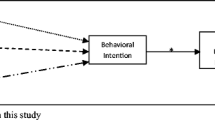Abstract
Dealing with students who cheat can be one of the most stressful interactions that faculty encounter. This study focused on faculty responses to academic integrity violations and utilized the Theory of Planned Behaviour model to predict the target behaviour of whether faculty would speak face-to-face with a student suspected of cheating. After an elicitation phase to determine modal salient beliefs, a questionnaire was developed to measure the model’s variables. The respondent database contained 206 tenured and non-tenured faculty from two large comprehensive universities. A stepwise multiple regression demonstrated the usefulness of the Theory of Planned Behaviour. Overall the model explained 43 % of the variance in predicting faculty members’ intention to speak face-to-face with a student suspected of cheating. The most significant contribution was made by subjective norms (β = 0.39), followed by attitude (β = 0.34), and perceived behavioural control (β = 0.24).


Similar content being viewed by others
References
Ajzen, I. (1988). Attitudes, personality, and behaviour. Chicago: Dorsey.
Ajzen, I. (1991). The theory of planned behavior. Organizational Behaviour and Human Decision Processes, 50, 179–211.
Ajzen, I. (2005) Personal website. Available online at: http://www.people.umass.edu/aizen (accessed 10 November 2010).
Ajzen, I., & Fishbein, M. (1980). Understanding attitudes and predicting social behaviour. Englewood Cliffs: Prentice-Hall.
Aldridge, A., & Levine, K. (2001). Surveying the social world: Principles and practice in survey research. Philadelphia: Open University Press.
Barrett, R., & Cox, A. L. (2005). At least they’re learning something: the hazy line between collaboration and collusion. Assessment and Evaluation in Higher Education, 30, 107–122.
Beck, L., & Ajzen, I. (1991). Predicting dishonest actions using the theory of planned behavior. Journal of Research and Personality, 25, 285–301.
Borg, E. (2002, July) Northumbria University lecturers’ experiences of plagiarism and collusion. Paper presented at the First Northumbria Conference—Educating for the Future, Newcastle on Tyne, UK.
Bowers, W. J. (1964). Student dishonesty and its control in college. New York: Bureau of Applied Social Research, Columbia University.
Byrne, C. A., & Arias, I. (2004). Predicting women’s intentions to leave abusive relationships: an application of the theory of planned behaviour. Journal of Applied Social Psychology, 34, 2586–2601.
Carroll, J., & Appleton, J. (2001). Plagiarism: A good practice guide. Oxford: Oxford Brookes University, Joint Information Systems Committee.
Coren, A. (2006). Faculty responses to academic integrity violations (Doctoral dissertation). Available from ProQuest Dissertations and Theses database. (UMI No. 3236909)
Dordoy, A. (2002, July) Cheating and plagiarism: student and staff perceptions at Northumbria. Paper presented at the First Northumbria Conference—Educating for the Future, Newcastle on Tyne, UK.
Francis, J. J., Eccles, M. P., Johnston, M., Walker, A., Grimshaw, J., Foy, R., et al. (2004). Constructing questionnaires based on the theory of planned behaviour: A manual for health services researchers. Newcastle upon Tyne: Centre for Health Services Research, University of Newcastle.
Fussell, J. (2005, June 7) High-tech tools assist today’s student cheaters, The Kansas City Star, Lifestyle section.
Harding, T. S., Mayhew, M. J., Finelli, C. J., & Carpenter, D. D. (2007). The theory of planned behaviour as a model of academic dishonesty in engineering and humanities undergraduates. Ethics and Behaviour, 17, 255–279.
Keith-Spiegel, P., Tabachnick, B. G., Whitley, B. E., Jr., & Washburn, J. (1998). Why professors ignore cheating: opinions of a national sample of psychology instructors. Ethics and Behaviour, 8, 215–227.
Mangione, T. W. (1995). Mail surveys: Improving the quality. Thousand Oaks: Sage.
McCabe, D. L. (2004, October 9–11) Student cheating: crisis or opportunity? Paper presented at the Center for Academic Integrity Conference, Kansas State University, Manhattan, KS.
McCabe, D. L., & Pavela, G. (1997). Ten principles of academic integrity. Journal of College and University Law, 24, 117–118.
McWilliams, J. E. (2004). Stealing the answers: prevaricators in the classroom. The Chronicle of Higher Education, 50, B5.
Prell, H., Berg, C., & Jonsson, L. (2002). Why don’t adolescents eat fish? Factors influencing fish consumption in school. Scandinavian Journal of Nutrition, 46, 184–191.
Quinn, T. G. (2010). In the arena: Building the skills for peak performance in leading schools and systems. Seattle: CreateSpace.
Reinecke, J., Schmidt, P., & Ajzen, I. (1996). Application of the theory of planned behaviour to adolescents’ condom use: a panel study. Journal of Applied Social Psychology, 26, 749–772.
Robinson-Zanartu, C., Cook-Morales, V., Pena, A. M., Afshani, R., & Nguyen, L. (2005). Academic crime and punishment: faculty members’ perceptions of and responses to plagiarism. School Psychology Quarterly, 20(3), 318–337.
Staats, S., Hupp, J. M., Wallace, H., & Gresley, J. (2009). Heroes don’t cheat: an examination of academic dishonesty and students’ views on why professors don’t report cheating. Ethics & Behavior, 19(3), 171–183.
Stern, E. B., & Havlicek, L. (1986). Academic misconduct: results of faculty and undergraduate student surveys. Journal of Allied Health, 15, 129–142.
Stone, T., Jawahar, I. M., & Kisamore, J. (2010). Predicting academic misconduct intentions and behaviour using the theory of planned behaviour and personality. Basic and Applied Social Psychology, 32, 35–45.
Tabachnick, B. G., Keith-Spiegel, P., & Pope, K. S. (1991). Ethics of teaching: beliefs and behaviours of psychologists as educators. American Psychologist, 46, 506–515.
Tomsho, R. (2006, August 15) Student plagiarism stirs controversy at Ohio University, Wall Street Journal-Eastern Edition.
Volpe, R., Davidson, L., & Bell, M. C. (2008). Faculty attitudes and behaviors concerning student cheating. College Student Journal, 42(1), 164–175.
Wasley, P. (2006). Review blasts professors for plagiarism by graduate students. The Chronicle of Higher Education, 52, A13.
Werner, P., & Mendelsson, G. (2001). Nursing staff members’ intentions to use physical restraints with older people: testing the theory of reasoned action. Journal of Advanced Nursing, 35, 784–791.
Author information
Authors and Affiliations
Corresponding author
Rights and permissions
About this article
Cite this article
Coren, A. The Theory of Planned Behaviour: Will Faculty Confront Students Who Cheat?. J Acad Ethics 10, 171–184 (2012). https://doi.org/10.1007/s10805-012-9162-7
Published:
Issue Date:
DOI: https://doi.org/10.1007/s10805-012-9162-7




